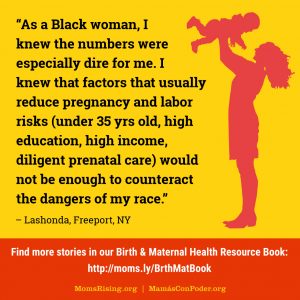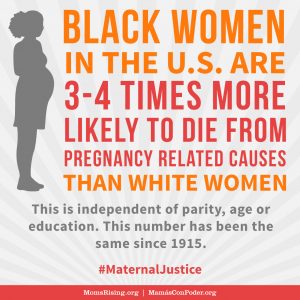
“Exhausted from labor, I had no idea what to even say or ask. I never ended up receiving an overview of the process, nor any information on what I should expect or do post-partum. I was in the hospital for four days post op. Four days of excruciating pain due to being undermedicated. Four days of my mother begging nurses & doctors to pay attention to me and bring me some much-needed relief, because these doctors like many others in the medical field, held the dangerous & biased belief that Black women don’t experience as much pain as white women.” – Patrisse Cullors, Co-Founder, Black Lives Matter & MomsRising Senior Fellow for Maternal Mortality
[dropcap]T[/dropcap]he U.S. is the most dangerous place to give birth in the developed world and more U.S. women are dying from pregnancy or childbirth complications today than in recent history. Like Patrisse, far too many women, especially Black women, have troubling experiences with maternal care and face debilitating or deadly maternal health outcomes. In fact, Black women, no matter their education or income level, are 3-4 time more likely to experience maternal mortality and morbidity, one of the widest disparities in all of women’s health.  And the issue is not limited to maternal deaths. For every woman who dies in childbirth in the US, there are 70 women who nearly die. The sad reality is that every year in the U.S., 700 to 900 women die from pregnancy or childbirth-related causes, and some 65,000 nearly die.
And the issue is not limited to maternal deaths. For every woman who dies in childbirth in the US, there are 70 women who nearly die. The sad reality is that every year in the U.S., 700 to 900 women die from pregnancy or childbirth-related causes, and some 65,000 nearly die.
Lack of Accessible Healthcare and Inconsistent Hospital Protocols Lead to Racial Disparities
[dropcap]W[/dropcap]hy is this happening? One of the core causes is our nation’s lack of quality, accessible healthcare, especially for women. The CDC has estimates that about 60% of maternal deaths would be prevented by better healthcare access. Another reason for the failing grade on maternal health is due to hospitals and providers providing unequal care and there being a lack of uniform, streamlined protocols when it comes to handling obstetric emergencies. Protocols often vary widely from hospital to hospital. Racism compounds this, and the devastating disparities that Black women face before, during and after pregnancy are because Black women are not listened to, face provider bias which includes the false and dangerous notion that Black people experience less pain than other races.
Monifa Bandele, vice president of maternal justice programs at MomsRising, pointed to a study published in 2016 “where they found that medical students still held this mythology that somehow Black people’s bodies could withstand more pain, that somehow Black bodies are more resilient.
“So we see those mythologies that [doctors] hold happening all across various health situations,” she said. “Black people are given less pain medicine for reporting the same amount of pain. When you think someone is superhuman, it’s actually dehumanizing.”
This could be seen in the the high profile birth stories of Serena Williams and Beyonce. Serena relayed her experience of not being heard and listened to, of having to advocate for oneself when it came to her birth. Being rich, powerful, famous and successful didn’t prevent her from facing the very same challenges that Black women face around birth. And these disparities start before getting to the delivery room. Overall, Black and Hispanic women were also more likely to meet their delivery doctor for the very first time during labor compared to white women and one in five Black and Hispanic women reported poor treatment from hospital staff because of their race, ethnicity, cultural background or language.
The bottom line is that the high maternal death and complication rates in our nation cannot be sufficiently addressed without focusing on closing racial disparities gap.
Legislative Solutions Exist to Address Racial Disparities in Maternal Health
[dropcap]T[/dropcap]here need to be systemic solutions to this systemic problem. Right now, some critical pieces of legislation have been introduced in Congress, the Maternal Care Access and Reducing Emergencies (CARE) Act (S.3363) and the Modernizing Obstetric Medicine Standards (MOMS) Act (S.3392). Both address this issue on a federal level while also implementing solutions on the individual and state level to begin chipping away at our nation’s maternal health problem
The Maternal Care Access and Reducing Emergencies (CARE) Act (S.3363) looks to create two new grant programs – one for implicit bias training and another for pregnancy medical home (PMH) programs which will help deliver health care services to pregnant women and new moms. The Modernizing Obstetric Medicine Standards (MOMS) Act (S.3392) would provide new funding to hospitals with obstetrics and gynecology practices that want to improve their response to pregnancy-related and pregnancy-associated complications by implementing standardized best practices that could save lives.
 Black women and mothers deserve better. There must be higher standards in the health care women access to and receive, and we must work together to ensure that Black mothers and mothers everywhere don’t risk and lose their lives giving life. We must call on Congress to address racial disparities in maternal health and improve hospital protocols as one of the steps to ensure healthy, safe and supportive births for all.
Black women and mothers deserve better. There must be higher standards in the health care women access to and receive, and we must work together to ensure that Black mothers and mothers everywhere don’t risk and lose their lives giving life. We must call on Congress to address racial disparities in maternal health and improve hospital protocols as one of the steps to ensure healthy, safe and supportive births for all.
Take Action
Please add your name to our open letter to Congress to urge them to stand up for the health of pregnant women in our nation here.




